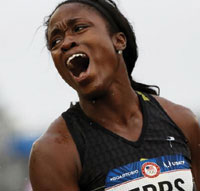

Morgan State releases study on Black female athletes pushing through racism and sexism excel
By Victor Ochieng
Over the years many female Black Athletes have excelled in the games by overcoming the negativity they are subjected to. Most of them face sexist and racist attacks from people who do not appreciate the work they are doing.
“People have called me a tomboy. I just view myself as an athlete. I go out there to compete, not to look pretty,” Christina Epps said, she is the one who represented Team USA in the 2016 Rio Olympic Games.
Jacqueline Jones has taken to examining how racist and sexist affect the Black female athletes. She said, “The resiliency by Black athletes and in particular Black female athletes is talked about in superficial ways, and I thought it was time to add to the research world what has happened to them across generations.”
According to the study:
- Serena Williams, who has won 23 Grand Slam tennis titles, has been compared to a “man” and a “gorilla.”
- Players on the 2007 Rutgers women’s basketball team were called “nappy-headed hos” by radio host Don Imus after losing to the Tennessee team in the NCAA final.
- The late Ed Temple, who coached Tennessee State track and field for 44 years and guided eight “Tigerbelles” into the National Track and Field Hall of Fame, said in an interview that his athletes were “ladies first, track girls second.”
For years women have fought to find their place in athletics and more so to be taken seriously. The study took to examine the experiences of women athletes in different games like tennis, track, golf, swimming, and basketball. “The women’s sports period is not taken as seriously as the men’s. There’s never been that same kind of respect for women athletes, and then when you layer race on top, it’s even harder. Women always had to find a way to compensate to how they were treated,” Jones added. “You take lemonade out of lemons. You take what’s thrown at you and make something good out of it.”
Racism and sexist opinions or behaviors didn’t start yesterday, and they are very present today’s society. These are factors that are deep rooted and can only be eliminated if people from both genders and all races; join hands together against these issues. A society that practices equality is better positioned to be more developed and economically stable than others. We therefore, can’t expect to move forward with part of the nation still nursing wounds that are yet to heal.
There are certain tropes we tend to fall under as writers. In some ways, it’s very lazy writing. ‘Let me feminize this athlete because I don’t want to make her appear masculine or overly muscular:’ or whatever it is, but still not respecting the athlete for her athleticism. It’s, ‘Let me tell you about all of these other things about her,’ Jones said of an article written in 2003. The article was published in the New York Times 15 years ago detailing how Leslie, was not right to the fans.


Be the first to comment